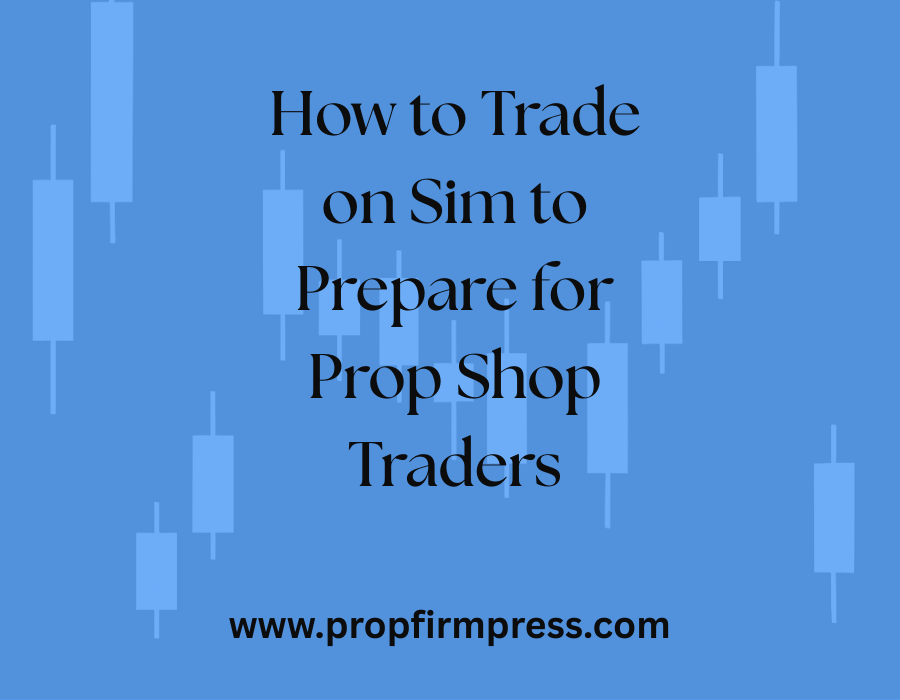How to Trade on Sim to Prepare for Prop Shop Traders
Trading on a simulator is a crucial step for anyone serious about becoming a successful prop shop trader. Prop shops demand consistency, discipline, and a mastery of strategies before allowing access to real capital. By starting your journey on simulation platforms, you can develop the essential skills required without risking real money. This approach is invaluable, especially for aspiring traders aiming to join established programs like Prop Shop Traders.
Understanding the Importance of Sim Trading
Simulation trading, or “sim trading,” mimics real market conditions using virtual funds. For traders targeting prop firms, sim trading is the proving ground where they can build confidence, test strategies, and acclimate to the pressures of trading without financial risk. Many traders underestimate the leaps they must make to meet the precise criteria set by firms such as Prop Shop Traders. These firms often require streak proof, consistency, and a deep understanding of risk management—traits honed best on a simulated platform.
Choosing the Right Simulator
Not all trading simulators are created equal. To prepare effectively for prop shop challenges, choose a simulator that offers real-time data, order execution identical to live markets, and access to multiple asset classes. Platforms supporting futures, stocks, or Forex with realistic slippage and commissions provide the best training environment. When you select your simulator, ensure it aligns with the type of products you’ll trade in a prop firm like Prop Shop Traders.
Setting Realistic Trading Goals on Sim
Simply executing trades on sim does not guarantee readiness. Establishing performance goals mirrors the targets expected by prop shops. For example, many firms ask for consistent daily profits, adherence to drawdown limits, and risk management discipline. When trading with simulated capital, set these constraints as if they were real: limit losses per day, define a clear profit target, and stick to risk percentages. This disciplined approach sharpens your trading psychology—a critical factor considered by Prop Shop Traders.
Developing and Testing Your Trading Strategy
Simulation trading is not just about practice; it’s an opportunity to refine your trading plan. Whether you favor scalping, swing trading, or trend following, validate your strategy’s effectiveness over significant simulated data. This process unveils strengths and weaknesses, allowing course corrections before risking real capital. Recording trades, analyzing setups, and adjusting indicators help build a robust strategy favored by prop firms like Prop Shop Traders.
Mastering Risk Management on Sim
Prop shops emphasize protecting capital as much as generating profits. Sim trading lets you experiment with various risk management techniques without emotional pressure from losing real money. Learn to calculate proper position sizes, utilize stop losses effectively, and manage your maximum drawdown thresholds. By mastering these skills, you demonstrate the credibility prop firms demand. Most importantly, practice respecting your risk rules in every simulated trade to align closely with prop firm standards.
Building Trading Discipline through Sim
Discipline separates successful prop shop traders from the rest. Sim trading offers a low-stakes environment to practice emotional control, patience, and adherence to your trading plan. Avoiding revenge trades after losses or impulsive decisions needs to be ingrained during this phase. Many traders fail to treat sim trading with the seriousness required, but maintaining discipline here directly translates to success in live prop shop challenges like those at Prop Shop Traders.
Tracking and Analyzing Your Sim Performance
Keeping detailed trading journals on your simulated trades helps identify patterns and improve your approach. Document entry and exit points, reasons for trade initiation, outcomes, and emotional state. Use this data to pinpoint mistakes and highlight your strengths. Systematic review builds self-awareness and confidence, key qualities prop shops want in their traders. Furthermore, firms such as Prop Shop Traders often encourage traders to demonstrate their improvement through logs and reports.
Simulating the Prop Shop Trading Environment
Beyond strategy and execution, preparing for a prop shop involves replicating the exact conditions you will face when trading firm capital. This includes adhering to time constraints, daily loss limits, and profit targets. Practice simulating these rules in your trading routine rigorously. Avoid trading outside your predefined parameters, just as you would in a real prop firm setting. This approach boosts readiness and aligns your habits with what Prop Shop Traders expect from their traders.
Psychological Preparation through Simulation
Trading psychology is often overlooked but is vital for success in prop trading. The transition from simulated to live trading is smoother when emotional responses are managed effectively. While simulation reduces psychological pressure, treat it as real money to build resilience. Encounter losses, avoid chasing losses, and maintain composure on good days. This mental strengthening is essential for passing the psychological challenges posed by prop firms like Prop Shop Traders.
Utilizing Sim Trading as a Stepping Stone to Prop Shop Traders
Once you’ve proven consistent profitability and sound risk practices on a simulator, you are ready to apply to prop firms such as Prop Shop Traders. Many firms have evaluation phases requiring traders to meet profit targets within risk limits. Your sim training will give you the discipline, strategy, and confidence to succeed here. The investment in sim trading pays off by increasing your chances of passing the qualification phases and becoming a funded trader.
Continuing Development Post-Simulation
Even after joining a firm like Prop Shop Traders, simulation trading remains a valuable tool. Use it to test new strategies, refine techniques, or adapt to changing market conditions without risking capital. Staying sharp on a sim platform complements your live trading and keeps you competitive in the rigorous world of prop trading.
